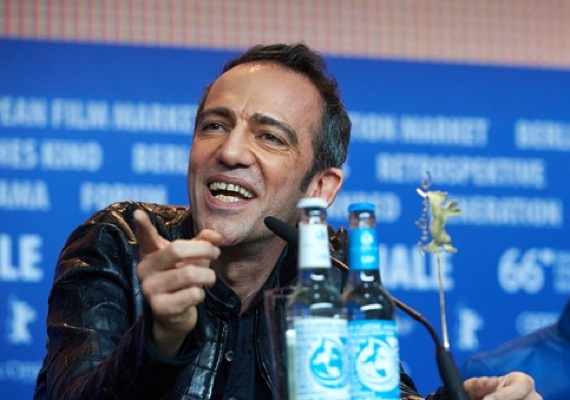Rafi Pitts • Director
“Nobody anywhere in the world wants to up and leave their own country”
- BERLIN 2016: Returning to the Berlinale with Soy Nero, director Rafi Pitts discusses how Green Card soldiers are a bellwether of the world’s dehumanisation

Iranian director Rafi Pitts, who has screened his latest film, Soy Nero [+see also:
film review
trailer
interview: Rafi Pitts
film profile], at the Berlinale, sat down to discuss his return to the German gathering and some of the issues explored in his movie.
Cineuropa: How does it feel to be back at the Berlinale six years after The Hunter [+see also:
trailer
film profile]?
Rafi Pitts: It's actually very hard. I mean, it's a wonderful celebration; you're very happy because your film finds a birthplace, a birth certificate, and all of a sudden it's alive. But you have to help the film, although you’d hope it speaks for itself. But you need to play your part as well, and this time I feel even more obligated because of the Green Card soldiers. What I'm aiming for is that the next time I'm at a film festival, nobody asks me, "What is a Green Card soldier?" Then I’ll have won the biggest award that Berlin could give me.
It's truly a very fascinating story, yet no one really knows of it.
I know; I cannot believe it. You know, the first deported Green Card soldier was deported 40 years ago, and I'm explaining it today. I find that incredibly abnormal. It actually makes me very uncomfortable: I'm not a visionary, but I came across that reality by sheer coincidence because I wanted to make a film about people being uprooted, or wanting to belong. And so when I came across that reality, it was a very violent realisation that we live in a world where politicians, intellectuals and journalists will all talk about immigration and integration, etc, but no one's ever heard of the Green Card soldiers. How did you guys miss that? What was everybody doing?
Yet the Green Card soldier is only a single string of your narrative, which threads through a far more complex sociological portrait of our times.
What I find sad is that, interestingly enough, Green Card soldiers come from all over the world, just like America itself. German Green Card soldiers exist, as do French, Iranian and Mexican ones. I chose to tell the story of an American one because of the absurdity of California once belonging to Mexico in the not-so-distant past, and now Mexico faces a wall that's stopping them from crossing into that land. Yet the economy of California is dependent on those Mexicans. So it's more about the human condition and its absurdity – that's the thing I was obsessed with.
Walls are a hot topic in European culture right now, and ironically we’re discussing them in a city that was divided by one for a long time. As a man of mixed heritage, what’s your take on the refugee issue?
There’s nobody in any part of the world who wants to up and leave their own country. And they should be respected for that. No Syrian will think, "I need to get the hell out of here," unless he has no choice but to do so. People like where they are, where they were born, where they live, where they feel comfortable with their surroundings, their life, their language and their culture. At the same time, humanism is disappearing very rapidly, and it's becoming a pageant. It's like what we saw with the dead boy on the beach in Greece. Everybody all of a sudden became very emotional, and we were all moved by it, no doubt, but since then, over 300 kids have died on that same beach, and there are no photographs, or if there are, we react like, "Oh, we've already seen that; let’s move on to the next thing."
Is this age of diminishing humanism leading to the return of the religious government?
I think that there's a strong need to believe in something. And in an era when ideologies have disappeared, religion is far more deeply rooted. If you look at the Muslim world, communists have been replaced by the Muslim Brotherhood. It's very sad when religion becomes a political party because I don't think the philosophy of religion has anything to do with that. I don't think any religion should be anywhere near politics because there's only abuse and misunderstandings that can stem from it. When the shootings in France took place, we were there, in that same neighbourhood, editing the film. And all of a sudden, everybody started talking about Muslims and the fear of Muslims. Suddenly, because of the speed of information, those terrorists became synonymous with six million people in a country. That's the world we're living in. And now, when I'm looking at France and the talk of taking away dual nationality if you're suspected of terrorism, I see governments selling out to get votes by giving in to fear, giving in to terrorism. It’s sad. I don't see why we need to live in such times.
Did you enjoy reading this article? Please subscribe to our newsletter to receive more stories like this directly in your inbox.















